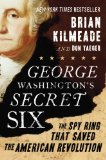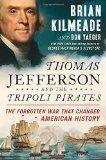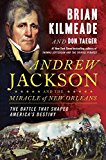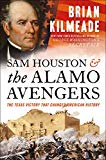|
 |
George Washington's Secret Six: The Spy Ring That Saved the American Revolution |
|
When General George Washington beat a hasty retreat from New York City in August 1776, many
thought the American Revolution might soon be over. Instead, Washington rallied—thanks in large part to a
little-known, top-secret group called the Culper Spy Ring.
Washington realized that he couldn’t beat the
British with military might, so he recruited a sophisticated and deeply secretive intelligence network to
infiltrate New York. So carefully guarded were the members’ identities that one spy’s name was not uncovered until
the twentieth century, and one remains unknown today. But by now, historians have discovered enough information
about the ring’s activities to piece together evidence that these six individuals turned the tide of the war.
Drawing on extensive research, Brian Kilmeade and Don Yaeger have painted compelling portraits of George
Washington’s secret six:
- Robert Townsend, the reserved Quaker merchant and reporter who headed the Culper Ring,
keeping his identity secret even from Washington;
- Austin Roe, the tavern keeper who risked his employment and
his life in order to protect the mission;
- Caleb Brewster, the brash young longshoreman who loved baiting the
British and agreed to ferry messages between Connecticut and New York;
- Abraham Woodhull, the curmudgeonly (and
surprisingly nervous) Long Island bachelor with business and family excuses for traveling to Manhattan;
- James
Rivington, the owner of a posh coffeehouse and print shop where high-ranking British officers gossiped about secret
operations;
- Agent 355, a woman whose identity remains unknown but who seems to have used her wit and charm to
coax officers to share vital secrets.
In George Washington’s Secret Six, Townsend and his fellow spies
finally receive their due, taking their place among the pantheon of heroes of the American Revolution. |
|
 |
Thomas Jefferson and the Tripoli Pirates: The Forgotten War That Changed American History |
|
This is the little-known story of how a newly independent nation was challenged by four Muslim powers and what happened when America’s third
president decided to stand up to intimidation.
When Thomas Jefferson became president in 1801, America faced a crisis. The new nation was deeply in debt
and needed its economy to grow quickly, but its merchant ships were under attack. Pirates from North Africa’s Barbary coast routinely captured American sailors
and held them as slaves, demanding ransom and tribute payments far beyond what the new country could afford.
Over the previous fifteen years, as a diplomat
and then as secretary of state, Jefferson had tried to work with the Barbary states (Tripoli, Tunis, Algiers, and Morocco). Unfortunately, he found it impossible
to negotiate with people who believed their religion justified the plunder and enslavement of non-Muslims. These rogue states would show no mercy—at least not while
easy money could be made by extorting the Western powers. So President Jefferson decided to move beyond diplomacy. He sent the U.S. Navy’s new warships and a
detachment of Marines to blockade Tripoli—launching the Barbary Wars and beginning America’s journey toward future superpower status.
As they did in their
previous bestseller, George Washington’s Secret Six, Kilmeade and Yaeger have transformed a nearly forgotten slice of history into a dramatic story that will keep
you turning the pages to find out what happens next. Among the many suspenseful episodes:
- Lieutenant Andrew Sterett’s ferocious cannon battle on the high seas
against the treacherous pirate ship Tripoli;
- Lieutenant Stephen Decatur’s daring night raid of an enemy harbor, with the aim of destroying an American ship that
had fallen into the pirates’ hands;
- General William Eaton’s unprecedented five-hundred-mile land march from Egypt to the port of Derne, where the Marines
launched a surprise attack and an American flag was raised in victory on foreign soil for the first time.
Few today remember these men and other heroes who
inspired the Marine Corps hymn: “From the Halls of Montezuma to the Shores of Tripoli, we fight our country’s battles in the air, on land and sea.” Thomas Jefferson
and the Tripoli Pirates recaptures this forgotten war that changed American history with a real-life drama of intrigue, bravery, and battle on the high seas. |
|
 |
Andrew Jackson and the Miracle of New Orleans: The Battle That Shaped America's Destiny |
|
The War of 1812 saw America threatened on every side. Encouraged by the British, Indian tribes attacked settlers in the West, while
the Royal Navy terrorized the coasts. By mid-1814, President James Madison’s generals had lost control of the war in the North, losing battles in Canada.
Then British troops set the White House ablaze, and a feeling of hopelessness spread across the country.
Into this dire situation stepped Major
General Andrew Jackson. A native of Tennessee who had witnessed the horrors of the Revolutionary War and Indian attacks, he was glad America had finally
decided to confront repeated British aggression. But he feared that President Madison’s men were overlooking the most important target of all: New Orleans.
If the British conquered New Orleans, they would control the mouth of the Mississippi River, cutting Americans off from that essential trade route
and threatening the previous decade’s Louisiana Purchase. The new nation’s dreams of western expansion would be crushed before they really got off the
ground.
So Jackson had to convince President Madison and his War Department to take him seriously, even though he wasn’t one of the Virginians and
New Englanders who dominated the government. He had to assemble a coalition of frontier militiamen, French-speaking Louisianans, Cherokee and Choctaw
Indians, freed slaves, and even some pirates. And he had to defeat the most powerful military force in the world—in the confusing terrain of the Louisiana
bayous.
In short, Jackson needed a miracle. The local Ursuline nuns set to work praying for his outnumbered troops. And so the Americans, driven
by patriotism and protected by prayer, began the battle that would shape our young nation’s destiny. |
|
 |
Sam Houston and the Alamo Avengers: The Texas Victory That Changed American History |
|
In his now-trademark style, Brian Kilmeade brings alive one of the most pivotal moments in American history, this time telling the
heart-stopping story of America's fight for Texas. While the story of the Alamo is familiar to most, few remember how Sam Houston led Texians after a
crushing loss to a shocking victory that secured their freedom and paved the way for America's growth.
In March 1836, the Mexican army led by
General Santa Anna massacred more than two hundred Texians who had been trapped in a tiny adobe mission in San Antonio for thirteen days. American
legends Jim Bowie and Davey Crockett died there, along with other Americans who had moved to Texas looking for a fresh start.
The defeat
galvanized the surviving Texians. Under General Sam Houston, a maverick with a rocky past, the tiny army of settlers rallied--only to retreat time and
time again. Having learned from the bloody battles that characterized his past, Houston knew it was poor strategy to aggressively retaliate. He held
off until just one month after the massacre, when he and his army of underdog Texians soundly defeated Santa Anna's troops in under eighteen minutes
at the Battle of San Jacinto, and in doing so won the independence for which so many had died.
Sam Houston and the Alamo Avengers recaptures
this pivotal war that changed America forever, and sheds light on the tightrope all war heroes walk between courage and calculation. Thanks to Kilmeade's
storytelling, a new generation of readers will remember the Alamo--and recognize the lesser-known heroes who snatched victory from the jaws of defeat. |
|
|


